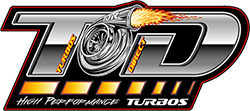FAQ Frequently Asked Questions
A turbocharger is a critical component highly customized for the engine. It uses an engine’s exhaust gas to drive the turbine wheel up to 350,000 RPM. The turbine wheel then drives the compressor wheel through a shaft. The compressor wheel provides compressed air to the engine, and this compressed-air makes the fuel burn more efficiently for greater power and fuel economy.
The turbo oil drain should be unrestricted and free flowing. We recommend NOT to use 90-degree fittings as they can cause restrictions and/or a back-up of oil flow.
Do NOT use any silicone on the paper gasket when installing the oil drain flange. Turbochargers and silicone do NOT go well together! Make sure both surfaces are clean, dry, and use just the paper gasket provided.
We also recommend that nothing smaller than a 5/8” or -10 AN drain line be used.
When draining the oil back into the oil pan, try and get it to return above the oil level in the oil pan. This allows the oil to flow freely and to drain back into the engine without the restriction of the oil sitting in the pan.
The turbo oil inlet size will vary depending on the application, with the most common sizes being -3 AN (3/16”) or -4 AN (1/4”) on the larger side.
If you are using a flange with a fitting that requires a paper gasket, do NOT use any silicone or sealer! Turbos and silicone do NOT go well together. Make sure both surfaces are clean, dry, and use only the paper gasket provided.
We recommend using an oil restrictor on ALL Garrett ball bearing turbochargers.
Garrett ball bearing turbos are very oil sensitive and do not require as much oil volume as other brands. Our standard restrictor sizes are .035”-.045” depending on application and oil pressure.
Typically, we do NOT recommend oil restrictors on journal bearing turbos unless you are running high oil pressure. (Those restrictors we make on a case by case basis.)
Too small of a filter, or a dirty filter, can cause damage to the turbocharger or cause it to pass oil on the compressor side of the unit.
Regular maintenance to the air filter is a must. You should clean or replace your air filter on a regular basis, and we recommend adding this service to your routine oil change intervals to make it easy to remember.
